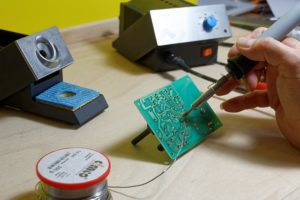
So you’ve examined the various types of Master’s in Engineering degree programs available and decided that a Master’s in Electrical Engineering degree is right for you. Now you want to know some of the careers available upon degree completion. Fortunately, a Master’s in Electrical Engineering affords each graduate a wide-variety of different career paths that are directly related to the coursework involved during their studies. Students can rest assured that with this degree that they will have a variety of exciting career options available to them. Here at Nonprofit Colleges Online, we’ve decided to highlight a few potential options for those with a Master’s in Electrical Engineering.
Types of Electrical Engineering Careers
Broadcast Engineer
Within the study of Electrical Engineering, is the study of broadcast technologies. Students who find this topic of study interesting, might find that a role as a Broadcast Engineer might be right for them. A Broadcast Engineer is somebody who works in the field of television, radio, and wireless broadcasting. Broadcast Engineers encompass the entire “broadcast chain” from transmitter to studio receiver. They must ensure that the signal being broadcast is being sent clearly and efficiently and is being picked up and processed by the proper receiver.
Featured Programs
Electrical Engineer
The most generalist position within the field of Electrical Engineering, an Electrical Engineer works in the design of electrical control systems. They work to create lighting, heating, and ventilation systems that work within the budgetary, safety, and quality constraints set about on a given project. They work from the research, design, planning, and implementation of an electrical system. Electrical Engineers also deal in the design of data transport networks as well. This field of work is highly important as it helps to build the hidden infrastructure that governs our everyday life.
Electronics Engineer
Similar to that of an Electrical Engineer, the Electronics Engineer concerns itself with the research, planning, design, and implementation of electrical systems within electronic components. Rather than focusing on large electrical systems, Electronics Engineers work to design electrical systems that are for electronic devices. Whether that is the design of the latest smartphone, or automated robots for manufacturing, electronics engineers design the electrical systems that make these electronics operate properly.
Network Engineer
A Network Engineer is somebody who is in charge of the implementation, maintenance, support, and development of communication networks. This job is multifaceted as it not only has a hardware component but also a major software component as well. Network Engineers must have the hands-on skills needed to design and implement the physical hardware of a network while also possessing the technical savvy to make sure that the network is properly set up to maximize efficiency while ensuring that it is secure from a cybersecurity perspective.
Naturally, their are many more positions available to those with a degree from one of our top Online Master’s in Electrical Engineering programs. Here at Nonprofit Colleges Online, we wanted to provide just a small sampling of some of the career options available once a student has completed that program of study. Students can look forward to large array of different job experiences available upon their degree completion.